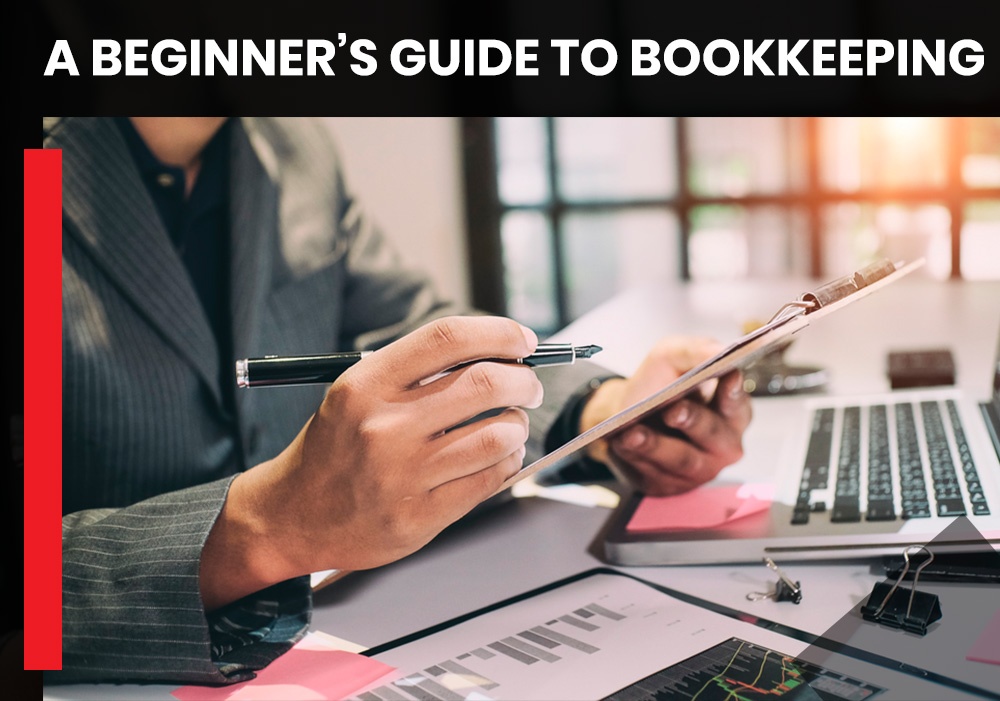A Beginner’s Guide To Bookkeeping

While several factors contribute to the success of a business, financial integrity is said to be one of the most important of these factors. The lifeline of any business is its financial status, and therefore, maintaining accurate accounting records is vital. With correct accounting information, you can assess your profits, expenses, and capacity to expand your business.
The key to maintaining accurate books of accounts is to stay organized and prepared through methodical bookkeeping. However, if you’re new to the bookkeeping process, you may stumble while preparing your books. The possibility of making costly mistakes as a novice is also high. To help you minimize errors and prepare your financial books appropriately, LNM Accounting Solutions has put together a Beginner’s Guide to bookkeeping.
Getting Started
Get bookkeeping software: To manage your financial information with ease, you must incorporate full-cycle bookkeeping software or be proficient with the Excel program. The latter can be complicated as it requires focus and continuous practice for quick and efficient usage.
Understand the principles of accounting: Understanding generally accepted accounting principles and the accounting standard relevant to your business will help you determine the correct entries in your books of accounts. Another aspect you must grasp thoroughly is the income tax act and how to adjust entries in your books from accounting income to taxable income.
Next Steps
Keep all relevant receipts and documentation: To prepare your financial books and file your taxes with ease, you must collect and maintain all of your receipts and other applicable financial documentation throughout the financial year. If you want to claim benefits or in the event of audits from the CRA (Canada Revenue Agency), you will need to produce these documents as physical proof of your income, investments, and expenses.
Have a full-cycle accounting system: A full cycle accounting system refers to all of the functions performed by a company’s accounting department to ensure all your financial needs are met. It is essential to accommodate all of the accounting functions performed by this department as it will simplify your needs and operations down the line and help you make the right choices for your business.
Hire a professional: Enlisting an experienced bookkeeper or accountant will ensure that your financial data is always in order and all your payment and tax commitments are met. Moreover, with them taking care of this aspect of your business, you will have more time to focus on what you do best. When looking for an accountant, ensure that you choose a knowledgeable expert capable of working quickly, efficiently, and accurately.
Advice From The Pros
Practice makes perfect: You have an entire year to get your books in order, which gives you sufficient time to look through past activities and make the relevant entries in your accounting books. Just make sure that you record your transactions regularly to get the hang of the task and do not make mistakes.
File the relevant documents: Collect and keep all of your receipts, invoice copies, and other relevant documents for at least six years. In case of audits or inquiries into your accounts from the CRA, these documents will prove your expenses and income.
Don’t give up: If you make errors in your financial records, don’t give up. Try again until you succeed. In case you find yourself struggling, you can ask your accountant or bookkeeper to review your financial statements or records and make changes if required. They can even take you through the process of recording transactions so you can go through it with ease in the future.
Avoid these mistakes: As we mentioned earlier, you need to understand certain aspects of your accounts and taxes, this will help you avoid costly errors like:
a. Assuming all transactions have sales tax.
b. Not knowing if your business is exempted from sales tax and how this affects the sales tax paid.
c. Not saving all receipts for a minimum of six years in case of an audit.
Digitize your receipts: To protect your business from an audit due to the lack of supporting documents, it is essential to file and preserve your bills and receipts. An excellent way to safeguard your financial documents is to digitize and store them on a safe and accessible database.
Consult a professional for guidance: By meeting with a professional bookkeeper before working on your accounts and bookkeeping, you can save yourself from several complications, misunderstandings, and errors. Therefore, do not skip this step. When you acquire a professional, ensure you ask them questions and make the most of their services.
Allocate sales tax appropriately: If the majority of your transactions occur on a business credit card or debit card, categorize your statements and then work on allocating sale tax from your receipts. Doing this should make the process easier.
For more details on how to handle your bookkeeping, reach out to LNM Accounting Solutions. We offer certified financial accounting and bookkeeping services in Kitchener, ON, to businesses in need of full cycle and remote bookkeeping assistance. We use the latest cloud-based accounting technology to expedite our services and ensure your complete convenience. When you choose our services, we not only manage your books but also complete your payroll, remittance and provide many other benefits. Our consultants even offer guidance on streamlining your business and suggest practical and proven methods to decrease cost and increase profit.
Visit our website to learn more or contact LNM Accounting Solutions today.